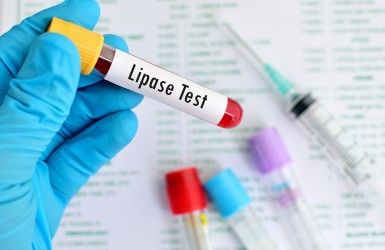General Health
Severe Abdominal Pain or Nausea After Meals Might Not Be Just Gas — Uncover Hidden Problems with a Lipase Blood Test
6 min read
By Apollo 24|7, Published on - 29 May 2025
Share this article
0
0 like

A lipase blood test is a diagnostic tool used to measure the levels of lipase in your blood. Lipase is an essential enzyme primarily produced by the pancreas. It plays a vital role in the digestion of dietary fats. When functioning properly, lipase breaks down fat molecules in the intestines, aiding in nutrient absorption and energy production.
The test is commonly ordered when there are concerns about pancreatic health, particularly when symptoms such as persistent abdominal pain or nausea arise. Elevated lipase levels can indicate inflammation or damage to the pancreas, such as pancreatitis. Because of its critical function in fat metabolism and its strong link to pancreatic conditions, a lipase blood test is often one of the first steps in evaluating digestive health problems.
How Does the Lipase Blood Test Help Identify Digestive or Pancreatic Issues?
The lipase blood test is especially useful in diagnosing acute pancreatitis, a sudden inflammation of the pancreas that can cause severe abdominal pain, vomiting, and fever. In such cases, lipase levels can rise significantly, sometimes to several times above the normal range.
In addition to pancreatitis, the test can help identify other conditions like:
- Chronic pancreatitis: Long-term inflammation of the pancreas, often associated with alcohol use or gallstones.
- Gallstones: These can block the pancreatic duct, causing elevated lipase levels.
- Pancreatic cancer: Although less common, abnormal lipase levels may raise suspicion of malignancies.
- Peptic ulcers or intestinal blockages: These issues may also affect lipase readings indirectly.
For individuals experiencing unexplained symptoms such as abdominal pain, nausea after meals, or bloating, the lipase test serves as a non-invasive method to rule out or confirm pancreatic or digestive tract issues.
Who Should Consider a Lipase Blood Test?
You should consider undergoing a lipase blood test if you experience any of the following persistent symptoms:
- Severe or recurring abdominal pain, especially in the upper abdomen
- Nausea or vomiting after eating
- Unexplained weight loss
- Bloating or a feeling of fullness
- Loss of appetite
- Certain groups are at increased risk of pancreatic issues and may particularly benefit from this test:
- Individuals with a history of gallbladder disease or gallstones
- Heavy alcohol users
People with high triglyceride levels
- Individuals with a family history of pancreatic disorders
- Those with recent abdominal injuries or surgeries
- Early detection through a lipase blood test can significantly improve outcomes by enabling prompt diagnosis and treatment.
How to Prepare for a Lipase Blood Test?
Preparation for a lipase blood test is generally straightforward, but following your healthcare provider's instructions is important for accurate results.
1. Fasting Instructions
- In most cases, you may be asked to fast (no food or drink except water) for 8 to 12 hours before the test.
- Avoid alcohol for at least 24 hours prior to the test, as it can affect enzyme levels.
2. Medication Considerations
- Inform your doctor about any medications, supplements, or herbal remedies you are taking.
- Some medications, including opioids, corticosteroids, and certain diuretics, can influence lipase levels.
3. Scheduling the Test
- The test is typically performed in a clinical setting, such as a hospital or pathology lab.
It can often be scheduled quickly if symptoms are acute or worsening.
What to Expect During the Lipase Blood Test Procedure?
The lipase test is a simple blood draw procedure that involves the following steps:
- A healthcare professional will tie an elastic band around your upper arm to increase blood flow.
- The skin will be cleaned with an antiseptic wipe.
- A needle will be inserted into a vein, usually in the arm, to collect a blood sample.
- The sample is then sent to a laboratory for analysis.
- Duration and Discomfort
- The entire procedure takes about 5 to 10 minutes.
- You may feel a slight pinch or sting when the needle is inserted.
- Minor bruising or soreness at the puncture site is common and should resolve within a day or two.
Have more questions?
Ask Apollo
Understanding Your Lipase Test Results
Once your blood sample is analysed, your healthcare provider will interpret the results.
Typical lipase levels in adults range from 0 to 160 units per litre (U/L), though ranges may vary slightly by laboratory.
- High levels of lipase in the blood may indicate:
- Acute pancreatitis: Lipase levels may be 3 to 10 times higher than the normal range.
- Chronic pancreatitis: Mildly elevated or normal lipase levels.
- Gallstones or bile duct obstruction: Often associated with spikes in lipase.
- Pancreatic cancer: May show persistent elevation.
- While less common, low lipase levels might suggest:
- Pancreatic insufficiency: The pancreas is not producing enough enzymes.
- Cystic fibrosis or chronic liver disease can also lower enzyme production.
Factors Affecting Lipase Levels or Test Accuracy
Several external factors and underlying conditions can influence lipase levels or skew test results:
1. Medications
Certain drugs can raise lipase levels in the blood, even without pancreatic disease. These include:
- Opiates (e.g., codeine, morphine)
- Oral contraceptives
- Thiazide diuretics
- Corticosteroids
2. Lifestyle Factors
Every day habits and recent dietary choices can also affect lipase levels:
- Alcohol consumption can cause or exacerbate pancreatic inflammation.
- High-fat meals shortly before testing may affect enzyme readings.
3. Medical Conditions and Procedures
Some health conditions and medical procedures can alter lipase readings or delay enzyme clearance from the body:
- Kidney disease can delay the clearance of lipase from the bloodstream.
- Abdominal surgery or trauma can temporarily increase lipase.
- Recent ERCP (Endoscopic Retrograde Cholangiopancreatography) can also impact results.
How Altered Lipase Levels Can Be Managed?
Managing altered lipase levels requires addressing the underlying cause. Treatment approaches vary depending on whether lipase levels are elevated or reduced.
Elevated Lipase Levels
- Pancreatitis treatment: Hospitalisation may be needed for IV fluids, pain management, and nutritional support. In cases of gallstone-induced pancreatitis, surgery might be necessary.
- Alcohol-related causes: Complete cessation of alcohol is critical. Supportive therapies, including counselling and rehabilitation, may be advised.
- Medication review: If certain drugs are responsible, a healthcare provider may adjust the prescription.
- Dietary adjustments: A low-fat, easily digestible diet is often recommended during recovery.
Low Lipase Levels
- Pancreatic enzyme replacement therapy (PERT): Used to supplement digestive enzymes when the pancreas cannot produce enough.
- Nutritional support: A dietitian may recommend a high-calorie, nutrient-dense diet tailored to aid absorption.
- Management of underlying conditions: Treating liver disease or cystic fibrosis can help stabilise lipase levels.
- Regular monitoring and follow-up tests may be needed to track progress and adjust treatment as necessary. Always consult your healthcare provider for a personalised management plan.
Conclusion
Severe abdominal pain or nausea after meals should never be dismissed as just indigestion or gas. These symptoms can be warning signs of more serious underlying conditions involving the pancreas or digestive system. A lipase blood test is a quick, minimally invasive diagnostic tool that can provide valuable insights into the health of your pancreas and help uncover the true cause of your discomfort.
By detecting abnormalities early, this simple test can lead to faster interventions and potentially life-saving treatments. If you or someone you care about is experiencing ongoing gastrointestinal symptoms, consult a healthcare provider about whether a lipase blood test is appropriate.
General Health
Frequently Asked Questions
Can lipase levels return to normal on their own?
Can lipase levels return to normal on their own?
Is the test painful?
Is the test painful?
How soon will I get results?
How soon will I get results?
What other tests may be ordered with lipase?
What other tests may be ordered with lipase?
Can a lipase test be used to monitor ongoing conditions?
Can a lipase test be used to monitor ongoing conditions?
Leave Comment
Recommended for you
.jpg?tr=q-80)
General Health
Persistent Body Aches or Unexplained Inflammation? Know Why Your Doctor Might Recommend an ESR Test
Suffering from ongoing body aches or unexplained inflammation? Discover how the ESR test helps detect hidden infections, autoimmune conditions, or chronic inflammation.

General Health
Brain Aneurysm: How Is It Different from a Stroke?
The cause of a stroke is either a blockage in an artery or an artery rupture, whereas the cause of an aneurysm is not known.

General Health
A Complete Guide To Constipation: Causes, Home Remedies, and Red Flags
Constipation is a common digestive issue affecting millions worldwide. If not treated in time, it can affect regular routines and quality of life. Read on to know the common causes, home remedies, red flags and more.
Subscribe
Sign up for our free Health Library Daily Newsletter
Get doctor-approved health tips, news, and more.
Visual Stories

Science-backed Home Remedies for Burns and Blisters
Tap to continue exploring
Recommended for you
.jpg?tr=q-80)
General Health
Persistent Body Aches or Unexplained Inflammation? Know Why Your Doctor Might Recommend an ESR Test
Suffering from ongoing body aches or unexplained inflammation? Discover how the ESR test helps detect hidden infections, autoimmune conditions, or chronic inflammation.

General Health
Brain Aneurysm: How Is It Different from a Stroke?
The cause of a stroke is either a blockage in an artery or an artery rupture, whereas the cause of an aneurysm is not known.

General Health
A Complete Guide To Constipation: Causes, Home Remedies, and Red Flags
Constipation is a common digestive issue affecting millions worldwide. If not treated in time, it can affect regular routines and quality of life. Read on to know the common causes, home remedies, red flags and more.